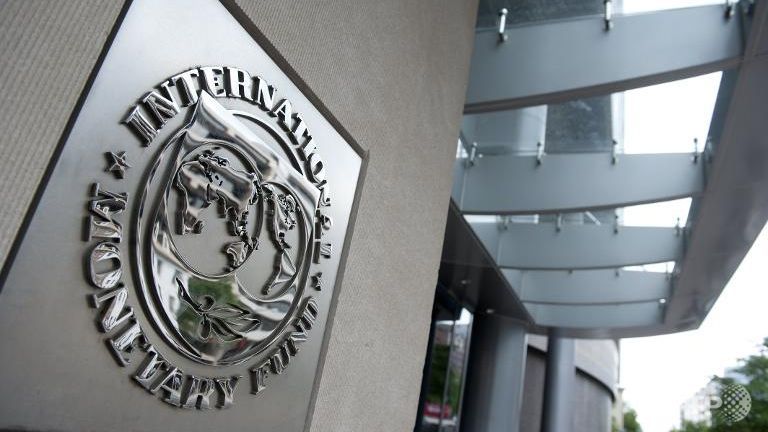IMF hikes eurozone growth forecasts, cautious on outlook
 The IMF headquarters in Washington, DC. (AFP/Saul Loeb) |
BRUSSELS: The IMF hiked its eurozone growth forecasts on Tuesday but warned the outlook was fragile, with the Ukraine crisis and uncertainty over Greece's future in the single currency bloc adding to concerns.
"A Greek crisis cannot be ruled out, an event that could unsettle financial markets," IMF chief economist Olivier Blanchard warned. But while "an exit from the euro would be extremely costly for Greece, extremely painful ... the rest of the eurozone is in a better position to deal with a Greek exit."
"It would still not be smooth sailing but it could probably be done," he said, noting economy and governance reforms adopted since the debt crisis to put the euro on a sounder base.
The 19-nation bloc is meanwhile getting a boost from lower oil prices, record low interest rates and the European Central Bank's massive stimulus programme, the International Monetary Fund said in its latest World Economic Outlook report.
"There are signs of a pickup and some positive momentum in the euro area, reflecting lower oil prices and supportive financial conditions but risks of prolonged low growth and low inflation remain," the IMF said.
The eurozone should grow 1.5 per cent this year, up from the 1.2 per cent estimated in January, gaining 1.6 per cent in 2016, up from 1.4 per cent. This is a solid improvement but still well short of the IMF's global growth estimate of 3.5 per cent for this year and 3.8 per cent next.
Consumer prices meanwhile are expected to edge up a minimal 0.1 per cent this year and by a still historically low 1.0 per cent in 2016, the IMF said. The ECB has an annual inflation target of just under 2.0 per cent.
The economy grew 0.9 per cent in 2014, recovering in the last quarter from a soft patch which had stoked fears of deflation - when prices fall outright prompting consumers to put off purchases, which in turn weakens demand and undercuts activity.
"The priority is to boost growth and inflation through a comprehensive approach," the IMF said, citing the ECB's stimulus measures, changes in tax policy to favour investment, structural reforms and strengthening the banks to put the economy back on track after the upheavals of the debt crisis.
The focus has to be on investment and jobs in an effort to get the economy growing, it said.
INVESTMENT, JOBS PRIORITY
The ECB has cut interest rates to record lows but the banks remain reluctant to lend to business, preferring instead to repair the debt crisis damage to their balance sheets as the authorities press them to bolster their capital reserves.
The ECB has also begun a "quantitative easing" programme to pump more than €1.0 trillion (US$1.1 trillion) into the economy through to next year to stimulate credit and demand. The IMF said the QE programme was "decisive," larger than expected and a welcome stimulus given the wider weaknesses in the economy.
"Both core and headline inflation have been well below the ECB's medium-term (target) for some time, with headline inflation turning negative in December," the IMF said, although the move appears to have "stalled the decline in inflation expectations."
Additionally, it has weakened the euro which should boost exports if for the moment there is little prospect of a strong turnaround. "The medium-term outlook of modest growth and subdued inflation in the euro area is driven largely by crisis legacies, notwithstanding the positive effects of the ECB's actions," the IMF said.
"High real debt burdens, impaired balance sheets, high unemployment and investor pessimism about prospects for a robust recovery will continue to weigh on demand. Uncertainty and pessimism regarding the euro area's resolve to address its economic challenges are likely to dampen confidence," it said.
The continued crisis in Ukraine plus an agonising renegotiation of Greece's debt rescue programme will weigh on sentiment too, adding to the downside risks posed by persistently low inflation.
"Economic shocks - from slower global growth, geopolitical events, faltering euro area reforms, political and policy uncertainty, and policy reversals - could lower inflation expectations and trigger a debt deflation dynamic," the IMF said.
What the stars mean:
★ Poor ★ ★ Promising ★★★ Good ★★★★ Very good ★★★★★ Exceptional
Latest News
More News
- Russian President congratulates Vietnamese Party leader during phone talks (January 25, 2026 | 09:58)
- Worldwide congratulations underscore confidence in Vietnam’s 14th Party Congress (January 23, 2026 | 09:02)
- Political parties, organisations, int’l friends send congratulations to 14th National Party Congress (January 22, 2026 | 09:33)
- 14th National Party Congress: Japanese media highlight Vietnam’s growth targets (January 21, 2026 | 09:46)
- 14th National Party Congress: Driving force for Vietnam to continue renewal, innovation, breakthroughs (January 21, 2026 | 09:42)
- Vietnam remains spiritual support for progressive forces: Colombian party leader (January 21, 2026 | 08:00)
- Int'l media provides large coverage of 14th National Party Congress's first working day (January 20, 2026 | 09:09)
- Vietnamese firms win top honours at ASEAN Digital Awards (January 16, 2026 | 16:45)
- ASEAN Digital Ministers' Meeting opens in Hanoi (January 15, 2026 | 15:33)
- ASEAN economies move up the global chip value chain (December 09, 2025 | 13:32)
















 Mobile Version
Mobile Version